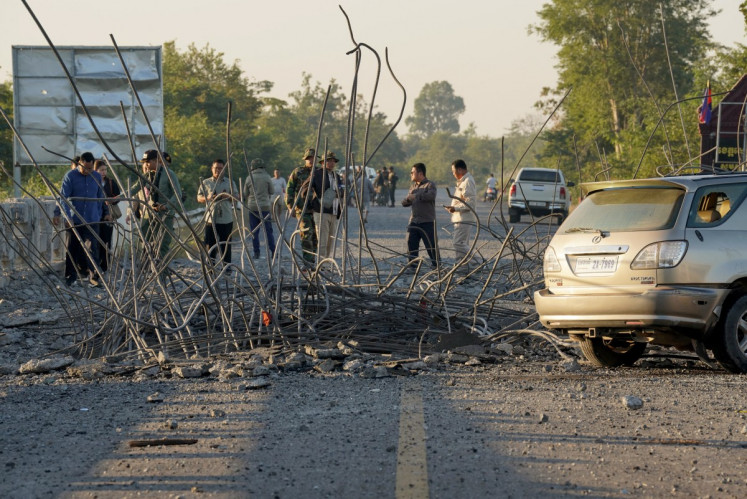Popular Reads
Top Results
Can't find what you're looking for?
View all search resultsPopular Reads
Top Results
Can't find what you're looking for?
View all search resultsInsight: Forging strategic partnership to advance democracy, pluralism
With democracy and pluralism threatened in many countries, it is easy to overlook the transformational impact of representative government
Change text size
Gift Premium Articles
to Anyone
W
ith democracy and pluralism threatened in many countries, it is easy to overlook the transformational impact of representative government. When US President Barack Obama welcomed President Joko Widodo to the White House on Monday, our nations had an opportunity to celebrate the different paths people around the world have taken in their journeys toward freedom, independence, and democracy.
In less than two decades, Indonesia has transformed from an authoritarian state to a vibrant democracy, decentralized, and increasingly lifted many of its citizens out of poverty. The country's commitment to democracy is recognized as a potential model for countries that are struggling to emerge from the shadow of authoritarianism.
As many Americans know, President Obama spent part of his childhood in Indonesia and has spoken about how his time there helped him 'appreciate the common humanity of all people'. This perspective links our nations in a fundamental way, well beyond the personal stories and shared experiences of our two leaders. Indonesia's foundational ideal of Bhinneka Tunggal Ika (unity in diversity), defines its people, just as E Pluribis Unum, or 'out of many, one', defines the American people. Both our nations value and protect freedom and dignity for all people.
Indonesia has the world's largest Muslim population, yet it is also home to a quarter billion people belonging to six major religions, living across 17,000 islands, speaking more than 700 languages. In addition to having more than 255,000 mosques, Indonesia is home to approximately 13,000 Hindu temples, 2,000 Buddhist temples, 1,300 Confucian temples and 61,000 churches. A Christian architect designed Jakarta's famous Istiqlal mosque. Indonesia is full of such stories ' people living and working together across faiths, seeing the humanity in one another and benefiting from their diversity.
Right now, our two nations, alongside many nations around the globe, are threatened by the growth of violent extremism that cannot see our common humanity and seeks to erase our common practice of tolerance. Countering violent extremism is essential to the security of all nations, and both of our nations recognize that no one can meet this challenge alone. When our two Presidents met on Oct. 26, the safety and security of our citizens and our global community was one issue at the top of their agenda, along with a shared economic agenda.
Indonesia plays a critical role in securing our shared future against terrorist threats, and the US and Indonesia both recognize that we must do this work together as governments and as peoples. For instance, Indonesia's government combats recruitment and propaganda of the Islamic State (IS), and its approach to fighting terrorism is based on the rule of law, law enforcement, economic development and religious engagement.
Indonesia's strong civil society has an important role to play in countering violent extremism. Muslim social organizations like Nahdlatul Ulama and Muhammadiyah set an example by engaging in dialogue with other faiths and encouraging tolerance. Most importantly, the success of Indonesia's democracy is a living testament to the compatibility of Islam, democracy and pluralism. Indonesia's achievements discredit the violent extremism of radical and other extremist groups while explicitly demonstrating inclusion, respect and opportunity.
Since 2010, the Indonesia-US partnership has deepened, demonstrating the global significance of enhanced cooperation between the world's second-and third-largest democracies, the tremendous possibilities for economic and development cooperation and the importance of fostering exchanges and mutual understanding between two of the world's most diverse nations. In order to meet evolving challenges and capitalize on emerging opportunities, our two Presidents plan to use the visit to elevate and transform the existing Indonesia-US Comprehensive Partnership into the Indonesia-US Strategic Partnership.
Under this new strategic partnership, our countries will expand cooperation in developing the energy sector, increasing maritime security, strengthening defense capabilities, promoting economic development, investing in our people and preventing illegal, unreported and unregulated fishing. Both countries will also work to address the regional and global challenges of our time, from stability in the South China Sea to global health. And as both of our nations care deeply about the future, it makes sense that we coordinate efforts to curb greenhouse gas emissions and to combat ' urgently and persistently ' the harmful effects of climate change.
Following our Presidents' historic meeting, we will continue to examine every opportunity to enhance our bilateral cooperation and work together to counter violent extremism and foster religious tolerance at home and around the world.
__________________________________
Retno LP Marsudi is Indonesian foreign minister and John Kerry is US secretary of state.










